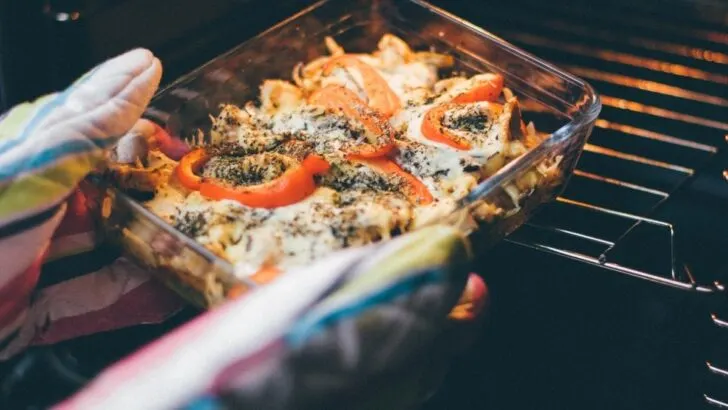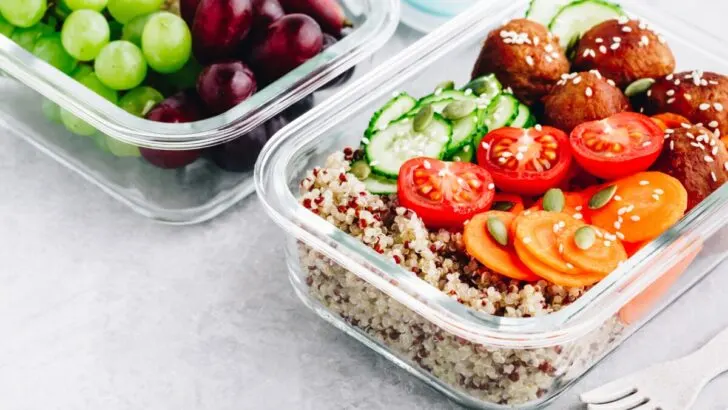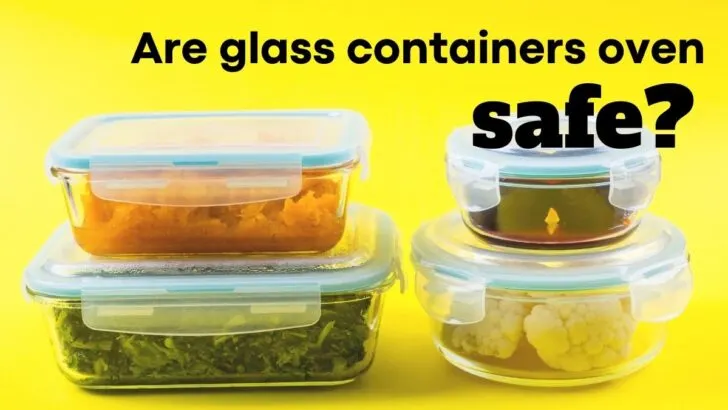Glass is easy to clean, retains heat longer, and has a clear surface for you to see your food as it cooks. It is a perfect medium for cooking, storing, and reheating food.
However, every kitchen owner has probably wondered at least once if a particular glass container is safe to bake in.
Some glass containers are oven-safe, while many aren’t. Whether or not a glass container is oven saf depends upon various factors such as material, temperature limits, and temperature fluctuation.
This can very easily be confirmed via a label on the container’s bottom. Recognizing oven-safe glass is an important kitchen skill everyone should learn to maximize their safety and efficiency.

Is My Glass Container Safe for Oven Use?
A container is oven safe if it can be placed into an oven without breaking or melting, and these days almost all containers are marked as such.
There should be a sticker or label declaring if the container is oven safe, or a symbol that looks like a bowl of soup with vertical curved lines above denoting smoke.
When interpreting text for oven safety, do not confuse “ovenproof” and “oven safe.” These are just British and American terms for the same word.
However, if the same company markets them as two different products, ovenproof is believed to handle higher heat than the other one.
If your glass container does not contain a label or it has been rubbed off, there are other things you can check to deduce whether your glass container is oven safe.
Material
Tempered glass is always safe to enter an oven. Produced with controlled chemical and thermal treatments, tempered glass is extremely tough, durable, and heavy which makes it reliable in an oven up to 400 degrees Fahrenheit.
This is more than enough for any of your baking needs, as 350 degrees is what you need for most casserole and cake recipes.
Similarly, borosilicate (containing boron trioxide) is another glass material that is popularized for its oven safety. Its low coefficient of thermal expansion makes it more resistant to thermal shock and high heat, without compromising on weight.
This lightweight glass can resist up to 450 degrees Fahrenheit of heat, and you will very rarely need anything higher than that.
Note that it is not just the material of the product but also its temperature range. Even an oven-safe glass container can stay intact up to a particular limit and this needs to be maintained at all times.
You should be wary of using any material besides these two in the oven, especially non-tempered glass. That should never enter an oven.
Every glassware product’s packaging clearly states its material but if yours doesn’t, you can use the owner’s manual. If you have misplaced that, googling the product company and model should get you the required details.
They are even available on that particular glass container’s Amazon web page.
As a general rule of thumb, drinking glasses are never put in the oven, whereas other products like bowls and plates on which you eat are also ill-advised.
Mason jars should also not go into the oven, even though you may have seen people bake in them. They work for boiling water but since they can only withstand up to 212 degrees Fahrenheit, meaning they are vulnerable to breakage in an oven. They also do not circulate heat evenly.
Internet
As you used the Internet to confirm the product’s material, you can use it to confirm its oven safety as well.
A quick search on the brand and type of glassware is enough to get the required product descriptions, and Amazon is an ideal platform for that too.
If you can’t find the company’s name on your glass container, any logos should be a giveaway.
If you can’t find the particular product you own online, you can even reach out to the customer service department of that brand with some pictures.
Accessories
Many companies are trying to innovate with design with so many different glass containers. Silicone sleeves or handles elevate the utility and design of a glass container but when that accessory is something like a metal attachment, that affects oven safety.
If your glass container contains anything metal related, be it aluminum foil or a copper trimming, your piece of equipment can go into thermal shock and should thus be kept away from an oven.

Ensuring Safety with Oven-Safe Glass Container
As discussed above, even oven-safe glass containers have certain precautions to be met such as the maximum temperature limit that varies from container to container, depending on the glass and chemicals used.
Other things to be on the lookout for include structural soundness and any drastic temperature fluctuations.
What do you think is safer to put in the oven? A brand new oven-safe container or one that is full of cracks from repeatedly falling over the years? These little details can make a big difference in how oven-safe your material is!
Therefore, you should inspect your glass container’s structural soundness and if you spot anything, it is better to be safe than sorry.
Another thing that can compromise glass integrity is its inability to withstand extreme temperature fluctuations.
If you take a glass container directly from the freezer or refrigerator and put it in a hot oven, the chances of breakage are very high. This is also true the other way around.
You should also never leave the bottom of the glass container bare. Add sauce or stock on the bottom before baking anything in that container in the oven.
The Bottom Line on Glass Containers Being Oven Safe
Most glass storage containers are safe for use in the oven but since that does not apply to all of them, you should know how to identify oven-safe products.
Be it the label, material, accessories, or the internet, there are a lot of resources at your disposal to find the glass container that best suits your needs.
Even after you make the purchase, there is a lot you can do to ensure oven safety of the glass container, your dinner, and your kitchen.
Using an oven is no child’s play, so make sure you’re careful!


